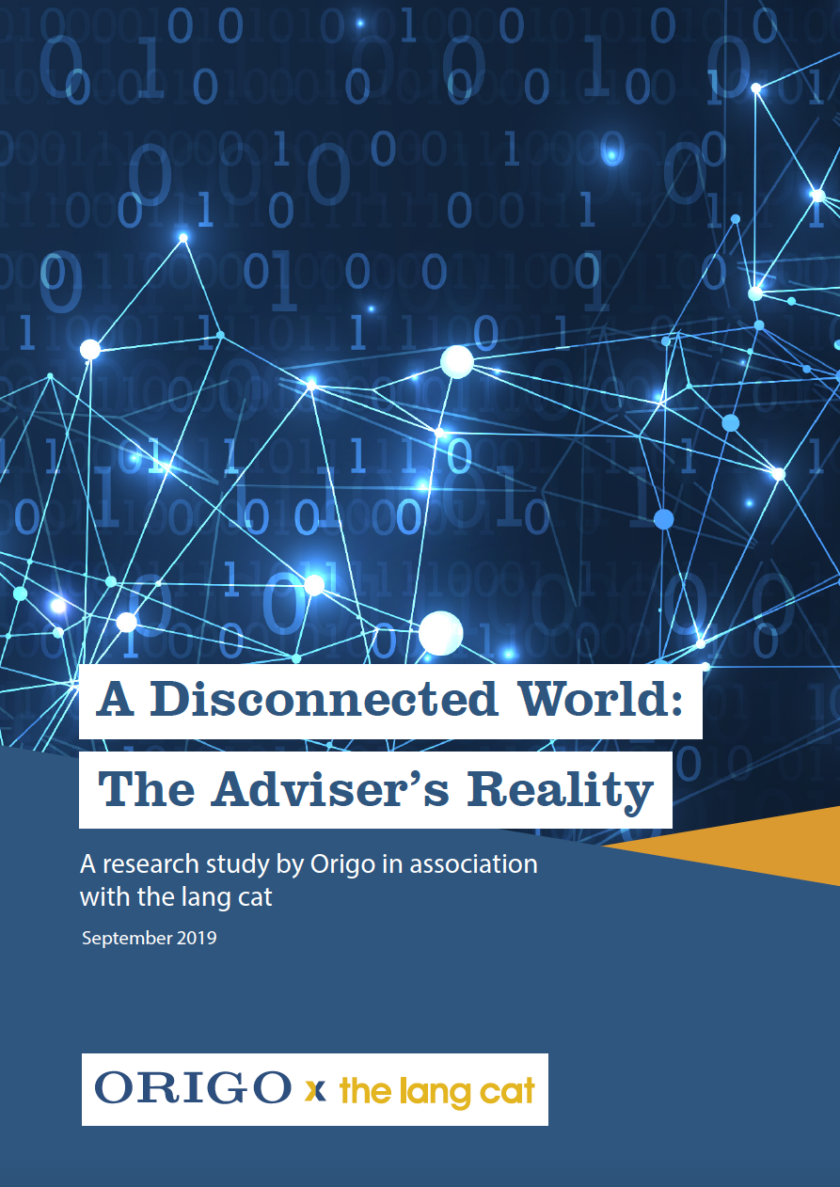“We knew things weren’t great but it was far worse than we thought,” is how lang cat founder Mark Polson described the lack of integration between platforms, back-office and adviser software tools and the effect on the work of paraplanners and administrators.
Polson was presenting the results of in-depth research his firm conducted on behalf of FinTech Origo into adviser firms’ processes and to what extent technology integration is helping businesses become more efficient and profitable. He said while a number of firms were trying to make advice firms’ lives easier, “what the industry has done hasn’t landed”.
Addressing a room of providers, he told how he witnessed administrators having to manually rekey information on average three times per client and print off spreadsheets of data and with a ruler go line by line down the spreadsheet trying to reconcile data, either because the systems they use are not integrated or, more significantly, they don’t trust the data output when they are.
Polson said the study mapped processes across three key areas – new business, creation of annual review packs and fee reconciliations – within 10 advice firms and conducted quantitative research with 116 more firms, and that 85% of firms agreed or strongly agreed that lack of integration is causing serious inefficiency in their business.
This technology disconnect, he added, means adviser firms are being forced to operate at a fraction of their potential. He estimates that in a typical business, staff could be up to 100% more efficient, dealing with twice the assets under administration they currently manage, if the systems they used were properly integrated with one another.
“Every firm is different. But we think in many cases each administrator could cope with perhaps twice as much asset under advice as they do now, if rekeying were eliminated and the production of client review packs in particular was radically streamlined.”
 Dan Atkinson, head of technical at EQ Investors painted the picture from a paraplanner perspective. He said: “As financial planning firms our job is to help clients achieve better outcomes. The technology we use is there to do the same thing. If the technology is not doing that it feels quite wrong to me.”
Dan Atkinson, head of technical at EQ Investors painted the picture from a paraplanner perspective. He said: “As financial planning firms our job is to help clients achieve better outcomes. The technology we use is there to do the same thing. If the technology is not doing that it feels quite wrong to me.”
Without the ability to verify the data produced it has to be taken on trust when presented to the client, he added. “Where the data is not up-to-date or complete or not consistently reliable then the trust that we have worked hard to build with the client gets broken.
“We want to spend less time on technology and more time servicing our clients and being more profitable. We’re lucky in that we have an IT team who with brute force can make systems integrate. But why should financial planning firms be doing that? And most can’t. There’s a great opportunity for the industry to do more.”
Polson added: “We were struck by the impact of these inefficiencies on adviser back offices. Even where integrations do exist, firms aren’t trusting them or using them – with good reason in some cases.
“There won’t be one answer for how to address this, and we love seeing system providers working on integrations in all their forms. But we do need to get on with it: clients would be horrified to see just how much inefficiency there is. Providers are generally responsive to customer demand: we think better, deeper and more reliable integrations should be at the top of every adviser’s wish list.”
 Anthony Rafferty, managing director, Origo, said: “Our research shows that currently, despite sterling work by some of the players in the market, advice firms do not benefit from a level of integration that is of real use to them.
Anthony Rafferty, managing director, Origo, said: “Our research shows that currently, despite sterling work by some of the players in the market, advice firms do not benefit from a level of integration that is of real use to them.
“Worryingly, in our research adviser firms said that the lack of consistent and quality integrations mean they distrust the data the systems are delivering and so revert to inefficient, costly and potentially risk inducing manual processes, but over which they have more control.
Rafferty explained that Integrations are typically point-to-point, with one provider integrating with another, for example for valuations. They are also driven by business case, with platforms, CRMs and other system providers naturally prioritising integrations that will bring in higher levels of returns.
“For a firm using two platforms, typically there are 23 point-to-point integrations required, without factoring in any protection, mortgage and office general office systems. So on a point-to-point basis, that level of integration is not going to happen.
“This disconnect is a very real and significant issue for advice firms, draining their resources on a daily basis.”
He added: “It is an inefficiency and cost to the industry, which given the integration technology available to the market, need not exist. It is an issue which if addressed will see a jump in advice firm efficiency, profitability and faster and better service to their clients.”
Rafferty pointed out that using a centralised hub to which platforms, CRMs and adviser software systems and tools can integrate for services pertinent to their operations, for example for valuations, bulk transaction history, transfer tracking and so on, would enable them to connect with any other provider on the hub for that service, no matter the volume of business.
“In this way, a centralised integration capability will significantly improve the market’s connectivity, helping advice firms to improve their efficiencies, their profitability and enabling them to deliver faster and better service to their clients, whilst potentially boosting business across the board.”
The full report can be downloaded here.































